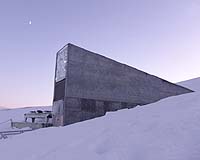 |
London (AFP) Oct 25, 2010 An apple tree heavy with fruit hangs over the road from a private garden, unnoticed by passers-by until fruit pickers start the age-old harvest ritual -- smack in the midst of London's urban jungle. Brandishing a long pole, Rupert Kenyon stretches to get the apples from even the highest branches while Marlene Barrett gathers them into a cart, to be sold or juiced. The city pickers' motivation is two-fold: partly in protest about tonnes of London fruit regularly left to rot, and partly out of environmental concern to promote locally-sourced food. And they have a wealth of produce to choose from in one of the world's greenest capitals, proud of its many parks, green spaces and private gardens. "Are those edible?" asked a man, intrigued, as he walked his dog on the leafy north London street where Kenyon and Barrett toiled away. In reply, Kenyon bit into a slightly dented but still shiny apply. "It has a pink flesh, it's pretty sour but they make nice red juice," he said. Most of the harvesters are volunteers but their numbers are swelling in London, a city of seven million people with a plentiful supply of trees -- but many of them unnoticed by busy local residents. "There is a lot of abandoned fruit in the gardens. People are not used to eating anything that does not come from a shop," said Kenyon. Choosing streets at random, the pickers take from publicly accessible trees and parks or knock on house doors to ask owners of fruit-filled gardens if they can harvest them. At one house, which hid a tiny yard where Barrett had previously picked fruit, only the cleaning lady was home and would not let them in. But thanks to publicity in the local press and a word-of-mouth campaign, the volunteers generally receive a warm welcome. The Organiclea association, which Barrett works for, collected about 30 tonnes of fruit last year -- mostly apples but also pears, plums, figs, nuts and cherries. The fruit is sold either in seasonal food boxes along with vegetables or is pressed into juice. Other similar ventures distribute pickings to schools or organisations that work with homeless people. "We are not trying to claim all these fruits are for sale. We are trying more to encourage everyone to see what is there and to make use of it," Barrett told AFP. And it seems to be working. "We used to collect from the grounds of a hospital. One year, they said: 'We're sorry, we are using the fruit'," she said, smiling. Big on the pickers' agenda is advocating the benefits of eating locally-grown food as the environmentally-friendly option. "We don't create the kind of problems that the big industry food system can create in terms of too much packaging and reduced nutrition because things have been stored for such a long time. And then there are the food miles they create..." she said. The volunteers say the London fruit is nutritious and tasty, and you can find varieties that are not stocked by major retailers. They also insist there is no risk of contamination by pollution, a claim endorsed by findings at the University of Sheffield in northern England where researchers examined city fruit and found it safe. However, many remain cautious, like Ahmed Iftikhar, a 26-year-old Pakistani who takes care to wash the pears he eats from a neighbour's tree. An enthusiastic picker, Iftikhar struggles to get all the pears down before they rot -- so welcomed the harvesters when they offered to help during one of their rounds. With their long pole, the team got some of the hardest-to-reach pears from the top of the tree -- a bumper crop from the "big smoke".
Share This Article With Planet Earth
Related Links Farming Today - Suppliers and Technology
 Philippines, Norway vaults play key roles in rice diversity
Philippines, Norway vaults play key roles in rice diversityLos Banos, Philippines (AFP) Oct 24, 2010 In a greenhouse near the Philippine capital, botanists grow strange grasses that bear tiny seeds which are promptly flown to a doomsday vault under Norway's Arctic permafrost. The Norway deliveries are just the newest facet of a decades-old effort by more than 100 countries to save the world's many varieties of rice which might otherwise be lost. A fire-proof, quake-proof, typhoon-proof ... read more |
|
| The content herein, unless otherwise known to be public domain, are Copyright 1995-2010 - SpaceDaily. AFP and UPI Wire Stories are copyright Agence France-Presse and United Press International. ESA Portal Reports are copyright European Space Agency. All NASA sourced material is public domain. Additional copyrights may apply in whole or part to other bona fide parties. Advertising does not imply endorsement,agreement or approval of any opinions, statements or information provided by SpaceDaily on any Web page published or hosted by SpaceDaily. Privacy Statement |